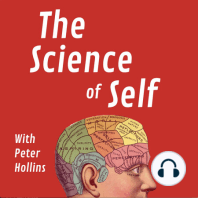33 min listen
Learning To “See”
ratings:
Length:
49 minutes
Released:
Aug 10, 2023
Format:
Podcast episode
Description
Easily listen to The Science of Self in your podcast app of choice at https://bit.ly/ScienceOfSelfPodcast00:02:05 Nobel Prize–winning theoretical physicist Richard Feynman is one of the best-known and most-loved scientists of our time.00:05:22 Think Like a Martian00:12:11 Consider the example of inventor Martin Cooper00:14:42 Feynman’s Advice: Play More!00:24:05 An Unexpected Cure for Burnout00:29:38 The Scientific MethodHear it Here - https://adbl.co/3OsoIY1• Feynman was a brilliant scientist because of how he thought, not what he thought. Whatever your vocation, skill set, expertise, special interest, or personal challenges, your life can be improved by learning to learn.• To see the world anew and without stale old misconceptions, try to look at it as though you were a Martian arriving on Earth for the very first time. What do you see? What would the world look like to you if you had no pre-existing beliefs about it, no biases, no prior understanding to cloud your observations?• Knowing the arbitrary symbols assigned to a thing is not knowing it. Look beyond language. • Relaxation, daydreaming, creativity, and fun are not impediments to serious intellectual activity, but an important part of it. Your mind is naturally curious about the world. Curiosity and playfulness is a big part of how it survives and evolves. Work hard, let go, then work hard again. “Serious play” still requires domain knowledge and is focused and purposeful. Burnout can be helped by this kind of play. • The scientific method is a way to structure our thinking and our approach to observation, gathering data, making predictions and theories, and inching our way closer to truth and understanding using reason and empiricism.• First make a guess about a new law. Then compute the consequences of the guess, then compare the computation results to nature. If the results disagree with nature, then your guess is wrong, if they agree, you have support for your hypothesis. What you want to be true is irrelevant; a scientist asks a question because they want to know the answer, not because they want to confirm what they already believe is true.#Feynman #FeynmansMentalModels #MentalModel #RussellNewton #NewtonMG #PeterHollins #TheScienceofSelf #RichardFeynman’sMentalModels #PeterHollins
Released:
Aug 10, 2023
Format:
Podcast episode
Titles in the series (49)
Self-Education Begins And Ends With Questions by The Science of Self
